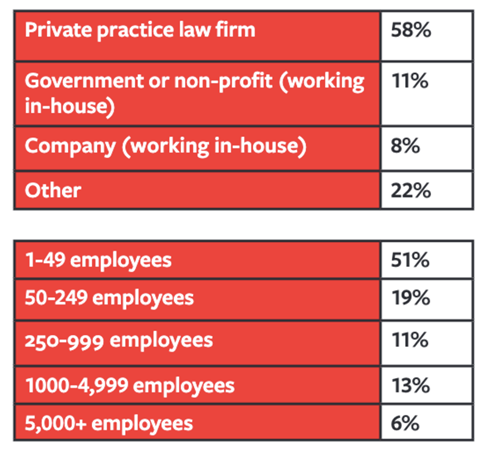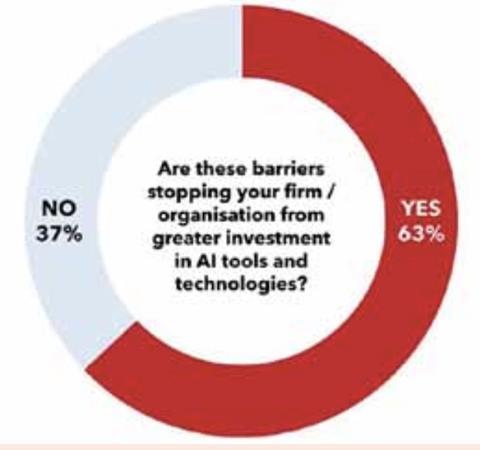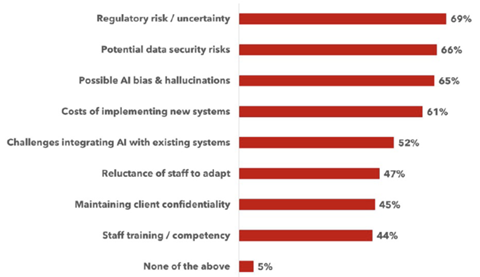Introduction
The use of artificial intelligence is accelerating globally on a daily basis. To understand current perceptions and usage within the legal sector, a survey was completed in August and September 2024 with The Law Society Gazette Reader Panel, sponsored by Canon UK. 128 surveys were completed in total with the following respondent profile:

‘AI is created by third parties, often based in other countries. As lawyers, we cannot be certain that the data is being appropriately handled or that the information is accurate/without bias’
Key take-outs
- Nearly half have used AI to digitise/automate activities in the last 12 months.
- Usage is more prevalent among smaller and private practice organisations.
- Efficiency and productivity are driving usage.
- Usage is more likely to be for softer activities such as research and document drafting/review rather than something which carries a regulatory or data risk.
- There is still significant mistrust of AI within organisations.
- Future business priorities are felt to be more ‘people’-focused than tech-focused, although over half would like to see more investment in digital transformation.
- The appetite is there – but organisations need confidence that there is no risk.
Usage of AI
AI usage is already common. Almost half of firms/organisations (47%) had used AI to digitise or automate specific areas in the last 12 months.
- Usage was more common among private practice law firm employees (49%), falling to a third (33%) for government/non-profit/in-house company employees.
- AI is most commonly used for legal research (31%) and document drafting and review (27%).
ChatGPT is significantly the most used AI technology (68%), with Microsoft 365 Copilot (34%) and Lexis+ AI (25%) being the main secondary options.
- Notably, those with fewer than 50 employees are utilising ChatGPT more than firms/organisations larger than this (76% vs 60%).

Benefits of AI
The main benefit of AI was perceived to be greater efficiency and productivity (58%).
- This was a more prevalent view in private practice law firms (65%), with this falling to 50% among government/non-profit/in-house company employees.
Other common benefits were enhanced legal research and cost reductions (both 33%).
- Cost reductions were significantly more likely to be highlighted by government/non-profit/in-house company employees than private practice law firms (42% vs 25%).
Risk management and mitigation (14%) and enhanced accuracy (17%) were least likely to be perceived as benefits.
Barriers and drawbacks of AI
The main barriers to adopting AI were largely legal, with 69% highlighting regulatory risk/uncertainty and two-thirds (66%) concerned about potential data security risks.
‘AI is created by third parties, often based in other countries. As lawyers, we cannot be certain that the data is being appropriately handled or that the information is accurate / without bias.’
This was further supported as:
- 56% agreed that ‘a greater reliance on AI will increase security risks for my firm/organisation’ and just 17% agreed that ‘greater reliance on AI will help prevent security risks for my firm/organisation’.
There were also common concerns about the accuracy of information based on AI bias or hallucinations (65%). These concerns were further highlighted as just 21% agreed that ‘my firm/organisation would place a great deal of trust in the hands of AI’.
Human adoption was felt to be the least common barrier, with less than half highlighting staff reluctance to adapt (47%) or staff training/competency (44%).
‘Risk management concerns and regulatory perception of greater exposure to risk or inaccuracy’
‘We’re concerned about security’
Future strategic priorities
The main strategic business priorities for 2024/25 were felt to be client- and staff-focused. 44% highlighted the client experience, with staff training and development (39%) and talent acquisition and retention (35%) the next most commonly highlighted.
Although just one in four (24%) felt that AI and technology investment was a main strategic priority for their firms/organisations, employees wanted more focus in this area with over half (52%) agreeing that they would like to see greater digital transformation investment.
- Notably, 22% indicated that they would prefer to use AI in their work compared to more manual methods.
Almost two-thirds (63%), however, believe that the aforementioned barriers are preventing their firms/organisations from making this investment.
Notably, the desire for more investment increased to 75% among government/non-profit/in-house company employees, however these were also more likely to feel that the barriers were preventing this from happening (75% vs 62% of private practice law firm employees where adoption and usage is already more prevalent).
Barriers and drawbacks of AI
The main barriers to adopting AI were largely legal, with
69% highlighting regulatory risk/uncertainty and two thirds
(66%) concerned about potential data security risks

Final thoughts
While AI is being used within the industry, it certainly isn’t embedded and is primarily used for softer purposes for task efficiencies. There is however clearly an appetite and opportunity for AI usage to become more prevalent across wider activities, but there are some key challenges to be overcome.
- Demonstrating accuracy to ease concerns about regulatory risk.
- Ensuring that organisations can be confident in data security.
- Evidencing tangible ROI to show how pointing limited resources in this area will ultimately drive long-term cost efficiencies and an improved client experience.
Ultimately, adoption may be slower than in other industries, but people are evaluating the opportunities and being more patient and measured to ensure effective implementation.
56% agreed that ‘a greater reliance on AI will increase security risks for my firm / organisation’ and just 17% agreed that ‘greater reliance on AI will help prevent security risks for my firm / organisation’






























No comments yet